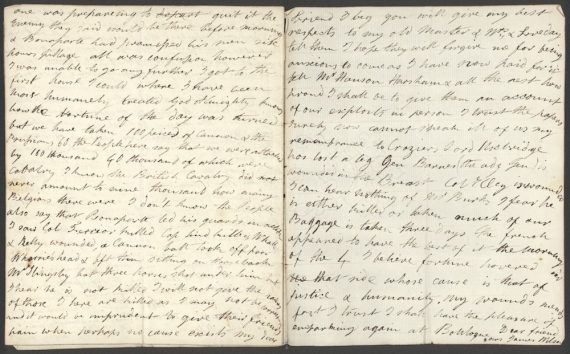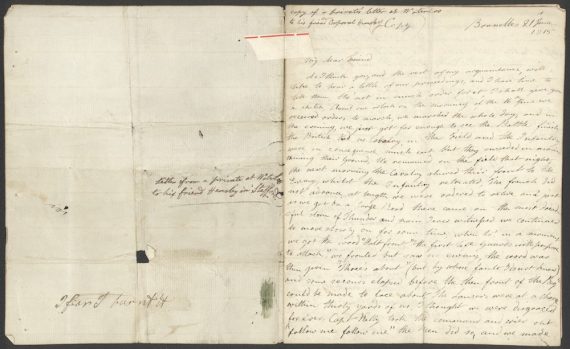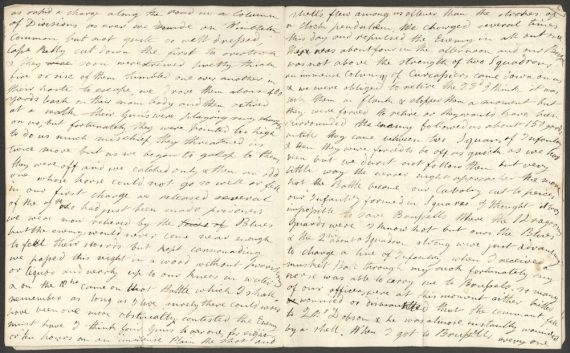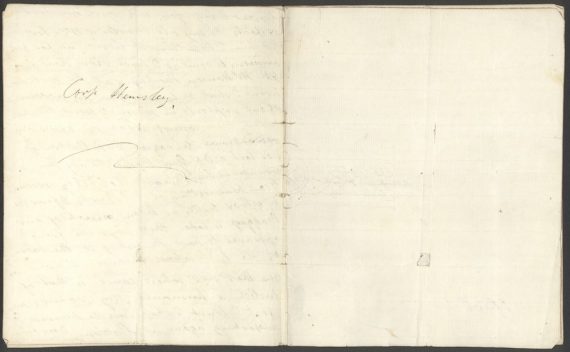- About
- Visiting
- What’s On
- Venue hire
- Catalogues
- Collections
- 101 Treasures of Chetham’s
- Digital Resources
- The Flowers of Histories
- A Book of Hours from France
- The Manchester Scrapbook
- Thomas Barritt of Manchester
- Art Treasures Examiner of 1857
- Manchester Association for Constitutional Order
- The North Western Museum of Science and Industry: Some Reminiscences by Richard Hills
- Criminal Manchester
- The Cup of Destiny
- Athenaeum Souvenir
- Middle English Manuscripts
- Manchester and Liverpool of Today
- Hollingworth’s Mancuniensis
- Memoir of Cecil Wray
- William Seward’s Diary
- The Anti-Monopolist
- Fishwick’s History of Rochdale
- Knyvett’s Defence of this Realm
- Tractatus de Nigromantia
- Axon Ballads
- Printed Books & Ephemera
- Archives & Manuscripts
- Prints and Photographs
- Blog
- Support us
Letter from Waterloo

Guest blog by Library volunteer, Paul Carpenter
Transcript of letter by Visitor Services Officer, Carlotta Dewald
On 21 June 1815, three days after the Battle of Waterloo, Private James Wilson of the 1st Life Guards wrote a letter to his friend, Corporal Hemsleyin, which he described his part in the battle. Waterloo brought an end to Napoleon’s madcap scheme to re-establish his empire and ushered in a long period of peace in Western Europe after decades of internecine warfare. Wilson’s eye-witness account was recently donated to the Library as part of collection of family papers belonging to the Heywood family of Manchester and Liverpool.
The British and their Allies were unprepared for war in 1815. Everyone assumed that the hard-won and costly victories of 1812 and 1813 had brought an end to Bonapartist despotism and that the former emperor was destined to a lonely exile on Elba. The story of the Hundred Days in which he re-established his army and his political dominium over France in early 1815 would be laughed out of any Hollywood script conference as utterly implausible. Nevertheless, in the Spring of that year the British Army found itself having to put an army into the field in Western Europe in a great hurry. Many of the veteran soldiers of the Peninsular campaign had been discharged, or their units had been disbursed overseas. Although there was a core of experienced officers and NCOs sent to the continent, many of the junior ranks were new recruits or volunteers from the militia. Many were very young and for many this was to be be their first action and also their last. It is quite likely that Pte. Wilson was one of those new recruits as he never mentioned any previous experience other than training exercises.
The fighting that James Wilson referred to on 16 June was in fact the opening salvo of Napoleon’s campaign. A scratch force of British, German and Dutch forces succeeded in holding the French Army at the strategic crossroads of Quatre Bras following an unexpected attack. On the 17th Wellington was compelled to withdraw his forces to the more easily defended ridge of Mont St Jean, a difficult and dangerous manoeuvre. The British Army was able to pull back from Quatre Bras in good order thanks to the successful rear-guard action of British light cavalry. The 7th Hussars had enabled the army to get through the pinch point of the Village of Genappe but were then tasked with holding the French in the village and preventing a French breakthrough. As a light cavalry unit, they were ill equipped for this task. This is the point where Pte. Wilson’s unit, the 1st Life Guards, is called into action.
Captain Kelly, referred to in the letter, was personally ordered to charge the French by Lord Uxbridge, Wellington’s second in command. The French Lancers, who were breaking out of the village, now posed a serious threat to the retiring infantry regiments. The 1st Life Guards were big men on big horses. A contemporary described watching the heavy cavalry advance as like watching a brick wall speeding towards you. This was a brick wall with attitude. It was a classic cavalry charge: heavy men and horses in close formation over open country at speed. Following the action described in the letter, Lord Uxbridge remarked to Captain Kelly that their achievement that day had “saved the honour of the British Cavalry”. There is no doubt that Pte. Wilson had taken part in a critical action which had an impact on the outcome of the battle. It would not be the last time.
When dawn broke on the 18th, following the miserable night described in the letter, the men of the 1st Life Guards found themselves ravenously hungry and thirsty. They had been called into action so suddenly they had only what few provisions they could carry in their packs. It was impossible to resupply them so they suffered from terrible hunger and thirst for the rest of that very long day. On the afternoon of the 18th they were stationed with the bulk of the army behind the ridgeline of Mont St Jean just South of the village of Waterloo. The battle was raging below the ridge as the French threw their forces against the fortified buildings of La Haie Sante and Hougoumont which were delaying their advance. It was then that Marshall Ney launched the main French attack upon the Ridge. Following a formidable and devastating artillery barrage and despite heroic resistance by the defending infantry, the French succeeded in breaching the defences and getting troops onto the ridge, threatening to establish a foothold there. Upon seeing this success Napoleon believed he was close to achieving victory and making good his boast that he would dine in Brussels that evening. It was now that Lord Uxbridge unleashed the combined cavalry forces of the Heavy Brigades. Pte. Wilson and his comrades made the crucial charge of the day that swept all before them, drove the French off the ridge and saved the day for Wellington. Unfortunately, they suffered terrible casualties in doing so.
When James Wilson wrote that they made several charges that day he was being modest. He was on the field to see his Regimental Colonel Samuel Ferrior killed. We know that Col. Ferrior was killed toward the end of that terrible day. We also know that he was credited with leading his regiment in no less than eleven charges on 18 June. The L.W. Dobson that James Wilson saw being hit shortly after taking command of the regiment was in fact the Regimental Quartermaster, which suggests that most if not all of the other officers had been incapacitated by that point. It is likely then that Pte. Wilson was wounded in one of the last cavalry actions of the day.
Although riding the ten miles to Brussels in his wounded and exhausted state must have been an ordeal, he is fortunate indeed that his horse was able to carry him there. There were medical services set up close to the fighting run by competent surgeons who did an extraordinary job in the face of overwhelming demand for their services. It is also true that many eminent surgeons travelled to Brussels to offer their services to the wounded of both sides. The major problem was the lack of any systematic way for the wounded to be removed from the field to a place of safety where they could be treated and cared for. Consequently, many men died where they fell, their wounds untreated and without food or water. Other men whilst unwounded remained trapped under their fallen horses unable to extricate themselves. Many of these men were robbed where they lay by enemy soldiers or later by scavenging civilians. It was not unusual for these men to receive further injuries, sometimes fatal, at the hands of the robbers.
Unfortunately, we have been unable to discover what happened to James Wilson after the battle. We know that in 1816, along with all the other British soldiers who fought in the battle, he was awarded the Waterloo Medal. He is identified on the medal roll as Corporal Wilson, so it seems he was promoted. He would also have received a share of prize money after the battle, something more usually associated with the Royal Navy. As a corporal, he would have been awarded the sum of £2:12s:6d (£2.62.5p). Hardly life-changing especially when compared to the £1,274:10s:4d awarded to generals. Importantly, men who lost equipment in the course of the battle were given an amnesty. Normally they could expect at least to have had their pay docked to cover the costs of the missing equipment and may have been punished further! All surviving soldiers were awarded two years’ seniority which counted toward their pension. This was a welcome reward for veteran soldiers as it meant they could retire two years early on a full pension. However, once it was established that Napoleon was securely in custody and in no position to renew his threat to the peace, the army establishment was subject to massive cuts. Many Waterloo veterans returned home to face the difficult economic and political realities of life in Georgian Britain. Four years later some of them were on St. Peters Fields in Manchester to witness a very different cavalry charge that became known, ironically, as Peterloo.




Transcript of letter
Bruxelles 21 June 1815
My dear Friend
As I think you, and the rest of my acquaintance, will like to hear a little of our proceedings, and I have time to tell them, tho’ not in much order for it, I shall give you a sketch. About one o’clock on the morning of the 16th June we received orders to march, we marched the whole day, and in the evening, we just got far enough to see the Battle finish, the British had no Cavalry, in the field and the Infantry were in consequence much cut but they suceeded [sic] in maintaining their [G]round. We remained on the field that night, the next morning the Cavalry shewed [sic] their front to the Enemy, whilst the Infantry retreated. The french [sic] did not advance, at length we were ordered to retire and just as we got to a large Road there came on the most dreadful storm of Thunder and rain I ever witnessed [.] [W]e continued to move slowly on for some time, when lo! in a moment we got the word “Halt front”. “[T]he first Life Guards will prepare to attack”, we fronted but saw no enemy, the word was then given “Three’s about” (but by whose fault I do not know) and some seconds elapsed before the then front of the Reg could be made to face about. The Lancers were at a charge within thirty yards of us. I thought we were disgraced for ever. Capt Kelly took the command and cried out “follow me follow me”[.] [T]he men did so, and we made
as rapid a charge along the road in a column of Divisions as ever we made on Wimbleton [sic] Common, but not quite so well dressed. Capt Kelly cut down the first he overtook & they soon were strewed pretty thick five or six of them tumbled one over another in their haste to escape, we drove them about 400 yards back on their main body and then retired at a walk. [T]heir Gun’s [sic] were playing very sharply on us, but fortunately they were pointed too high to do us much mischief, they threatened us twice more but as we began to gallop to them they were off and we catched [sic] only & then an odd one whose horse could not go so well or fell in our first charge[.] [W]e released several of the 7th who had just been made prisoners[.] [W]e were now relieved by the Blues but the enemy would never come near enough to feel their swords but kept cannonading[.]
[W]e passed this night in a wood without provisions or liquor and nearly up to our knees in water
& on the 18th came on that Battle which I shall remember as long as I live[.] [S]urely there could never have been one more obstinatly [sic] contested[.] [T]he Enemy must have I think four Guns to our one, for eight or ten hours on an immense Plain the shot and
shells flew among us oftener than the strokes of a clock pendulum. We charged several times this day and repulsed the Enemy in all but one[.] [T]his was about four in the afternoon and our Brigade was not above the strength of two Squadrons[.] [A]n immense Column of Cureassier [sic; cuirassier], came down on us & we were obliged to retire the 23d I think it was ???? them in flank & stopped them a moment but they were forced to retire or they would have been surrounded[.] [T]he enemy followed us about 150 yards untill [sic] they came between two Squares of Infantry & then they were forced to be off as quick as we had been but we durst not follow them but very little way [.] [T]he nearer night approached the more hot the battle became[.] [O]ur cavalry cut to peices [sic][,] our Infantry formed in Squares[.] I thought it was impossible to save Brussells [sic][.] Where the 7 [or 1?] Dragoons Guards were I know not but ours the Blues & the 2nd about a Squadron strong were just advancing to charge a line of Infantry when I received a musket Ball through my neck[.] [F]ortunately my horse was able to carry me to Brussels. [S]o many of our officers were at this moment either killed[,] wounded or dismantled that the commant [sic] fell to LW Dobson & he was almost instantly wounded by a shell. When I got to Brussells [sic] everyone
one [sic] was preparing to quit it[.] [T]he Enemy[,] they said[,] would be there before morning &
Bonaparte had promissed [sic] his men six hours pillage[.] [A]ll was confusion[,] however I was unable to go any further[.] I got to the first house I could where I have been most humanely treated[.] God Almighty knows how the fortune of the day was turned but we have taken 100 peices [sic] of cannon & the Prussians 60[.] [T]he People here say that we were attacked by 160 thousand[,] 40 thousand of which were cavalry [.] I know the British Cavalry did never amount to nine thousand [,] how many Belgians there were I don’t know [.] [T]he People also say that Bonaparte led his guards in action [.] I saw Col Ferrior killed[,] Cap Lind [?] killed, Whall [?] & Kelly wounded, a Cannon ball took off poor Wharrie’s [?] head & left him sitting on Horseback. M Slingsby hat [sic] three horses shot under him but I hear he is not killed[.] I will not give the names of those I here [sic] are killed as I may not be correct and it would be imprudent to give their friends pain when perhaps no cause exists[.] My dear Friend[,] I beg you will give my best respects to my old Master & Mrs, & Loveday[.] [T]ell them I hope they will forgive me for being anxious to come as I have now paid for it[.] [T]ell Mr Hanson Harsham & all the rest how proud I shall be to give them an account of our exploits in person[.] I trust the papers surely now cannot speak ill of us [.] [M]y remembrance to Croziers [.] Lord Uxbridge has lost a leg [,] Gen Barnes (the ady[?] Gen) is wounded in the Breast [,] Col Elley is wounded [.] I can hear nothing of Mr Burks [,] I fear he is either killed or taken [.] [M]uch of our Baggage is taken [.] [T]hree days the french [sic] appeared to have the best of it[.] [T]he morning of the 4 I believe fortune hovered in that ride whose cause is that of justice & humanity. My wounds mends [sic] fast[.] I trust I shall have the pleasure of embarking again at Boulogne[.] Dear friend[,]
yours[,] James Wilson
